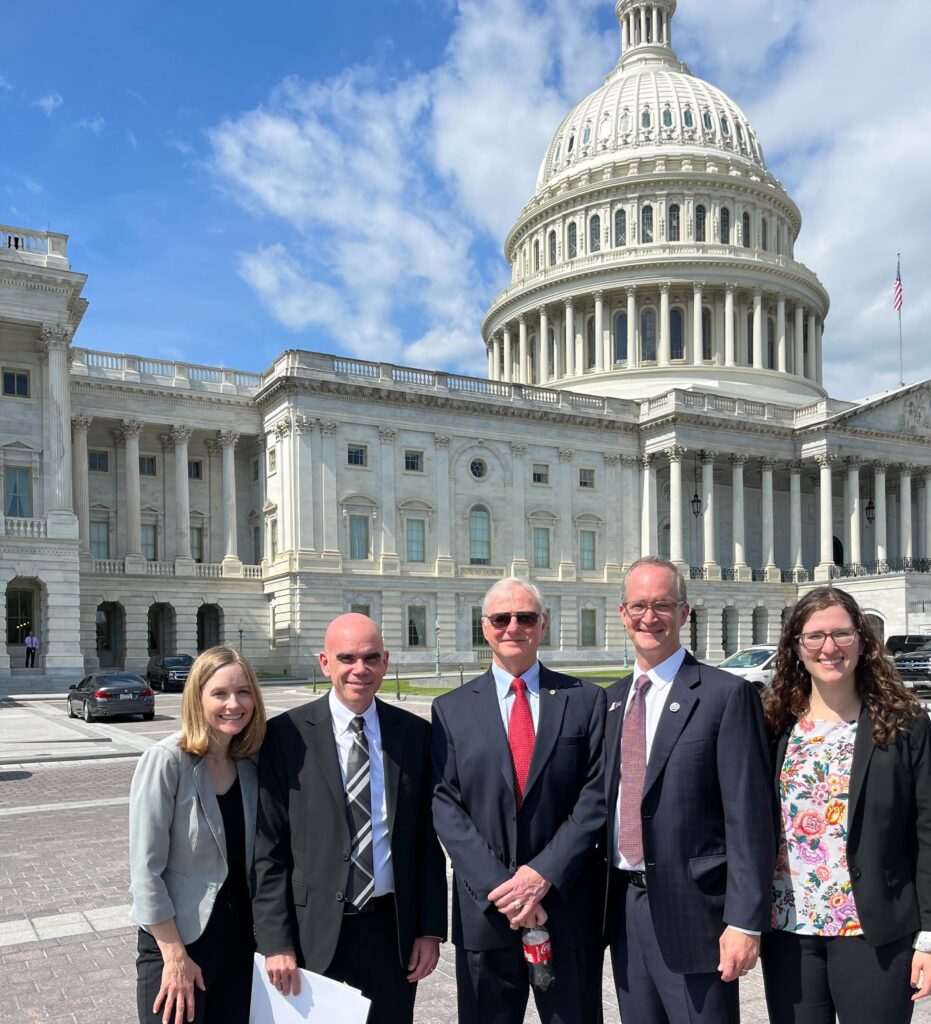By Casey Korba, Director of Policy
Changing policy is like exercise: consistency is key. No single meeting or individual paper seems to change anything, just as no solitary workout fundamentally improves your health. But staying consistent will bring change. Our wins in 2023 were earned in 2022, 2021, 2020 and even earlier. We look back on our consistency in 2023 and look forward to 2024.
Making the Case for ACOs in the Legislature
Connecting physicians with their legislators on Capitol Hill

The Policy team accompanied Aledade member physicians from across the country to meetings both in person and virtually with legislators this fall, to advocate for the accountable care organization (ACO) model. The physicians had the opportunity to explain how savings from the Medicare Shared Savings Program (MSSP) helps keep their practices open, with some being the only source of primary care in their rural communities. The ACO model has enabled many of them to hire more staff and develop strong long-term relationships with patients and their families. It has also enabled practices to invest in infrastructure to focus on prevention and chronic disease management. (Hear more on The ACO Show podcast.)
Testifying at Congress on fostering competition and strengthening value
This year, Aledade had the opportunity to testify in front of Congress, participate in Congressional briefings to educate lawmakers on the value of the ACO model, and share learnings on passing and implementing primary care investment legislation in states.
Aledade’s Chief Policy Officer Sean Cavanaugh testified in front of the Energy and Commerce Committee Subcommittee on Health this April during a hearing that targeted improving competition to help lower costs for patients. Cavanaugh recommended strategies Congress could take, including adopting site-neutrality rules and creating more fairness in payment through legislation that creates parity across practice settings. Aledade continues to advocate for prohibiting anti-competitive behavior, such as information blocking. We also support the Federal Trade Commission being provided adequate resources and using its statutory authority to investigate harmful consolidation and promote competition.
Dr. Christine Meyer, an Aledade member physician who runs a practice in Exton, Pa., participated in a briefing to educate a bipartisan group of Congressional staffers on value-based care. The briefing, sponsored by the National Association of ACOs (NAACOS), enabled Dr. Meyer and other experts to share how physician-led ACOs deliver high-quality care, reduce workloads for practices, and lower costs through reducing emergency room and hospital admissions.
Shaping policy in the state houses
At the state level, Aledade brought legislators to Aledade physician policy committee meetings around the country. In Alabama and Arkansas, we had dialogues with elected officials and their staff on the burdens of prior authorization and potential policy solutions. In North Carolina, a Congressman’s health staffer visited an Aledade member practice to learn about its day-to-day operations. Our national collaborative webinar series brought together Aledade member physicians, stakeholder experts and legislators in Arkansas, Oregon and Rhode Island, to discuss successes and barriers in state legislation addressing primary care investment and administrative workloads.
Managing Policy Change
In preparation for the end of the COVID-19 public health emergency (PHE), states began the process of unwinding expanded Medicaid policies instituted during the PHE by removing ineligible beneficiaries from Medicaid after a three-year pause. Aledade teams worked with state Medicaid agencies and health plan partners to identify affected patients, and tailor outreach with messaging that aligned with the states’ campaigns.
Additionally, North Carolina implemented Medicaid Expansion this month. Aledade is working to help close coverage gaps and ensure access to quality care for patients. As a convener in North Carolina, we partner with four of the five Medicaid managed care plans. If a patient switches from Medicare to Medicare Advantage, or if they switch from Medicaid to a commercial plan, we have them covered. Aledade stands ready to make expansion as smooth as possible in North Carolina for patients, families and practices.
At the federal level, we aligned all practices with their best option in MSSP based on changes coming in 2024. We launched a REACH ACO in 2023 to provide an ACO option in traditional Medicare for those practices that rely on nurse practitioners, physician assistants or exclusive care teams. We advocate for the best policies while at the same time making the most of the policies we have.
What to Watch
Congress likely to address physician fee cuts in January
In November, Congress moved to address the expiration of the Advanced Alternative Payment Model (AAPM) incentive payment as well as physician fee cuts finalized in the Physician Fee Schedule (PFS). Although there won’t be an omnibus spending package this year, other health legislation could move as standalone bills or riders on packages, though it is most likely that Congress will act on these priorities in January.
Expect movement on telehealth in 2024
Congress extended many of the flexibilities from the PHE through 2024. We expect to hear more about telehealth in the new year. The Senate Finance Committee recently held a hearing to look at making many of the current flexibilities permanent, signaling the kind of discussions Congress has in store. Aledade is advocating for telehealth policies that strengthen primary care, reduce burden for ACOs and increase flexibility at the state level.
Policy changes in the 2024 PFS will help recruit and retain MSSP participants
The 2024 PFS brings many positive changes to MSSP, signaling that CMS is focused on continuing to refine, grow and evolve the flagship ACO program through making improvements in benchmarking, risk adjustment, quality reporting and attribution. We look forward to working with CMS and the ACO community in 2024 to ensure that primary care clinicians in MSSP continue to be the quarterback of care that complex patients need.
As we gear up to advocate for policies in next year’s regulations, we are focusing on:
- Improving the benchmarking methodology and increasing the long-term opportunities in ACOs
- Getting enhanced primary care payments for ACO practices to assist in cash flow and investment
- Improving quality reporting requirements
- Reducing administrative workloads for practices
- Rolling out a full risk track in MSSP for those who want to take on more risk



